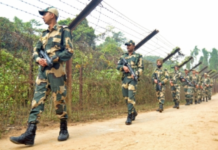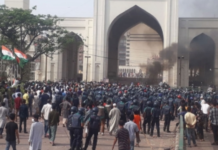Washington– Bangladesh’s interim National Security Advisor (NSA), Khalilur Rahman, met with U.S. Deputy Secretary of State Christopher Landau on Wednesday at the State Department to brief American officials on the interim government’s efforts to facilitate national elections.
Rahman, who is visiting the United States from June 16 to 26, is holding a series of high-level meetings with U.S. officials. During the meeting, Landau reaffirmed the United States’ support for Bangladesh and discussed a range of bilateral and regional issues, including the Rohingya crisis, trade and tariff negotiations, regional developments in South Asia, and the country’s ongoing democratic transition.
“Enjoyed meeting Bangladesh NSA Rahman today and hearing about the Interim Government’s efforts ahead of the national elections,” Landau wrote on X (formerly Twitter) after the meeting. “We discussed the U.S.-Bangladesh relationship, including expanding trade and commercial ties. The U.S. is committed to working with Bangladesh to promote peace and stability in the region.”
Rahman also met separately with Assistant U.S. Trade Representative Brendan Lynch to discuss reciprocal tariff agreements between the two nations.
The meeting between Rahman and Landau notably coincided with former U.S. President Donald Trump’s hosting of Pakistani Army Chief General Asim Munir at the White House, highlighting a day of strategic engagement with South Asian stakeholders in Washington.
Rahman has been a controversial figure within Bangladesh’s political and military circles. He is reported to have played a key role in facilitating Western-backed logistics and supply operations through the proposed Shilkhali-Naikhongchhari route in the Rakhine Corridor near Teknaf—a plan that has sparked domestic backlash. Bangladesh’s Chief of Army Staff, General Waker-uz-Zaman, has publicly opposed the corridor, warning that it could jeopardize the country’s sovereignty and territorial integrity. Zaman had called for Rahman’s removal, a request reportedly rejected by interim leader Muhammad Yunus.
Rahman’s background includes a long career in international diplomacy and trade policy. Before returning to Bangladesh, he reportedly spent over two decades in the United States, at times using the alias “Roger Rahman,” while still serving in official capacities. He began his international career in 1991 as a Special Advisor at the UN Conference on Trade and Development (UNCTAD) in Geneva and went on to serve in various senior roles at the United Nations in New York and Geneva. His positions included Chief of the UN’s Least Developed Countries (LDC) Program, Chair of the UN interagency group on non-tariff trade barriers, and Principal Coordinator for programs on emerging sectors in global trade.
Rahman’s political opponents, including members of the Bangladesh Nationalist Party (BNP), have accused him of compromising national interests through his involvement in the controversial Rohingya Corridor and alleged misuse of the Chittagong Port.
According to some reports, Rahman also recently met with the Chinese ambassador in Dhaka before traveling to London, where he is believed to have sought a meeting with the head of Pakistan’s Inter-Services Intelligence (ISI) agency. (Source: IANS)













